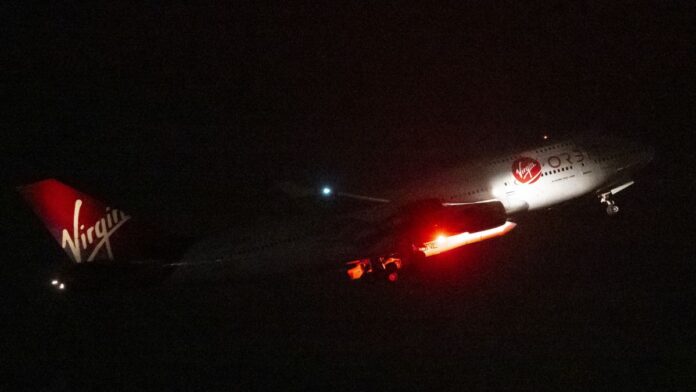NEWQUAY, U.K. — The first-ever orbital mission to lift off from the United Kingdom did not go as planned.
That flight, the “Start Me Up” mission by Virgin Orbit, started out well enough. The company’s carrier plane, known as Cosmic Girl, lifted off from Spaceport Cornwall here on schedule Monday (Jan. 9) at 5:02 p.m. EST (2202 GMT).
Cosmic Girl dropped Virgin Orbit’s 70-foot-long (21 meters) LauncherOne rocket at 6:09 p.m. EST (2309 GMT), while the plane was off Ireland’s southwest coast. The rocket’s first stage did its job, and LauncherOne’s two stages separated as planned about 3.5 minutes after the drop.
The rocket’s upper stage finished a nearly five-minute burn shortly thereafter, then went into a long coast. It was during this phase that we learned something had gone wrong.
“It appears that LauncherOne has suffered an anomaly, which will prevent us from making orbit this mission,” Virgin Orbit’s Chris Relf, director of systems engineering and verification, said during a webcast of the mission. Details were not immediately available.
Related: The UK really wants commercial spaceports
The failure resulted in the loss of nine satellites. Those payloads are an in-orbit manufacturing experiment by the U.K. company Space Forge; several U.K. defense cubesats, including two for studying the ionosphere, the upper layer of Earth’s atmosphere where space weather occurs; and an experimental global navigation satellite co-funded by the European Space Agency.
“Start Me Up,” which took its name from the famous 1981 song by the Rolling Stones, was an important mission for Virgin Orbit. All five of the company’s previous orbital flights originated from the Mojave Air and Space Port in southeastern California, so “Start Me Up” opened a new launch chapter for the company.
At a pre-launch press conference on Sunday (Jan. 8), Virgin Orbit CEO Dan Hart said the company may be back at Spaceport Cornwall later this year and is also eyeing other locations all over the world.
“We’re excited about the future and coming back, maybe as soon as later this year, to launch again and hopefully get a rhythm going,” Hart said. “We want to be a part of the fabric of the space community here in the U.K. as well as globally. That’s our objective as a company.”
“Start Me Up” was also a very big deal for the United Kingdom. Tickets for viewing the takeoff of Cosmic Girl from Spaceport Cornwall, otherwise known as the Newquay Airport, sold out faster than those for the U.K.’s iconic Glastonbury music festival, according to Ian Annett, deputy CEO of the U.K. Space Agency.
Space geeks from the southwestern Cornwall region of England and beyond braved the cold to witness the historic moment, despite occasional rain showers and gusty wind that made the 48-degree-Fahrenheit (9 degrees Celsius) temperatures onsite feel even colder.
They weren’t able to witness the rocket drop, but they did see Cosmic Girl return safely to the airport.
The U.K. announced plans to develop infrastructure for small satellite launches in 2014 in hopes of growing its share of the global space market. The country is home to some leading small satellite manufacturers, including Airbus, Surrey Satellite Technology and Clyde Space. Before “Start Me Up,” those satellites had to be shipped elsewhere for launch.
“The space industry is worth around £6.5 billion [$7.7 billion] annually for the U.K. economy,” Annett said during Sunday’s pre-launch press conference.
“As a country, we build more satellites than anywhere else outside of the U.S.,” he said. “So it helps to develop an end-to-end capability so that we can do everything.”
According to Melisa Thorpe, Spaceport Cornwall CEO, it cost £20 million ($24 million) to convert the tiny Newquay airport into a space-ready site. Seven sites overall received funding from the U.K. Space Agency in 2017 to help with the space-directed upgrades.
Two other sites are currently in the final stages of space launch preparations: SpaceHub Sutherland in the north of Scotland and SaxaVord Spaceport on the Shetland Islands off the Scottish coast. Both of these spaceports will serve vertical micro-rocket launches and hope to see their first lift-offs later this year.
Virgin Orbit had been riding a streak of four consecutive launch successes until today. Those four missions had placed 33 satellites into orbit for a variety of customers.
Follow Tereza Pultarova on Twitter @TerezaPultarova (opens in new tab). Follow us on Twitter @Spacedotcom (opens in new tab) and on Facebook (opens in new tab).

